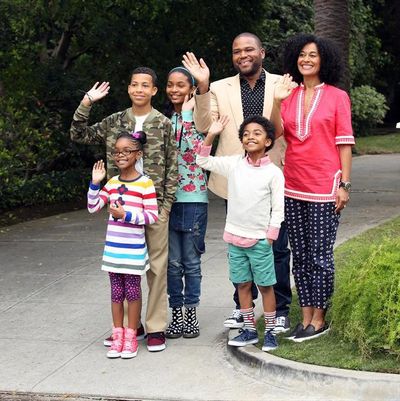
Set in the leafy suburbs, and co-created by Kenya Barris, a writer on America’s Next Top Model, black-ish is about an upper-middle-class African-American family whose patriarch Andre “Dre” Johnson (Anthony Anderson) worries that they’re moving up in the world at the expense of their cultural identity. Narrated by Dre, and shot — à la The Wonders Years and Malcolm in the Middle — as a laugh-track-free mini-movie, the show strikes universal notes by being specific. This is not a TV program that pretends race and racism don’t exist except in Very Special Episodes filled with teachable moments, nor is it one that insists that they can be ignored or somehow overcome by working hard or whistling a merry tune; it insists instead that there’s a whole continuum of discrimination and misunderstanding, that every band on the continuum has its own subtle gradations, and that subjectivity plays a huge part in the whole thing.
A supervisor at the ad agency where Dre works who tries to talk “black” isn’t made to seem like a despicable person, just clueless and irritating; Dre reserves the “honorary brother” designation for a white co-worker who doesn’t do that, a guy who talks to Dre as if he’s just another guy. When Dre worries in voice-over that he and his wife Rainbow (Tracee Ellis Ross) and their kids are exotic curiosities in the suburbs, and hallucinates a safari bus full of white folks observing them outside of their “natural” environment (the inner city), the joke is mostly on Dre for being so insecure, but the tone of the moment also suggests he’s not wrong to feel that way — that his feelings of alienation are coming from a real place. There are jokes about Dre’s agency using “urban” as a commercial euphemism for “black,” and a lively conversation between Dre and Rainbow about whether her biracial roots make her somehow “less” black than Dre (“If I’m not ‘really’ black, could somebody please tell my hair and my ass?” she says). There are also some stinging exchanges between Dre and his dad, Pops (Laurence Fishburne), about whether the money he makes working at a predominantly white agency trumps the pride he’d feel if he were the president of a predominantly black firm. (Pops describes the new job Dre’s up for as “head puppet of the white man.”)
At the same time, though — and this is the impressive part — black-ish isn’t entirely about those things. It’s saying, “If you’re not white, here is the kind of stuff you have to contend with every day,” but it’s presenting it in a familiar and collegial way, with the tone of a comedian saying, “Don’t you hate it when …?” It’s not saying that’s all there is to life, just that it’s a factor for Dre.
The show’s very particular observations always connect with situations that aren’t that particular — that have, in fact, been true throughout time, for everyone, of every culture. Consider the conflict when Dre’s son Andre Jr., who encourages his buddies to call him Andy, says he’d rather try out for lacrosse than basketball and tentatively inquires about the possibility of being bar mitzvah’d. Dre interprets it as a specific rebuke to blackness, or to Dre’s own notion of what “blackness” implies (his proposed alternative to the bar mitzvah is hilariously wrongheaded, as his dad points out); but in the end, all of this discord is not unlike the “authenticity” battles that have occurred in households of every race, ethnicity, and nationality over the centuries: parents pressuring children to enter a parent’s line of work, or to worship the same way (or worship, period), and otherwise become extensions of them, rather than discovering and nurturing their own identities, however alarming those might be to their parents. “You feel like I’m turning into a white boy,” says Andre. “But I’m not. I’m just being me. But I don’t know what that is yet.”
When Dre says he wants his kids to be “black, not black-ish,” he’s trying to get at something very culturally specific, and yet — and this is the beautiful part — as soon as he names exactly what’s eating him, he (and we) realizes that it’s not as specific as he thinks, and that, in fact, he’s on a quixotic quest. He might as well be trying to cup some water in his bare hands and keep it there forever. How much of Dre’s anxiety comes from race and culture, and how much is midlife crisis in disguise? We wonder, and black-ish seems to wonder along with us. In its own sweet way, this is a landmark show.


